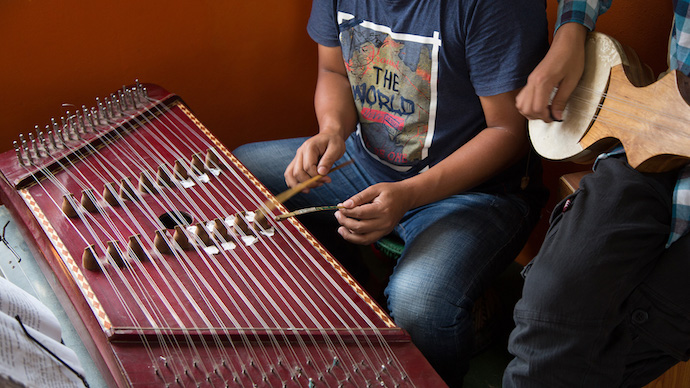My dog howled every time I hit a certain note on my bamboo flute. He would lift up his head and cry as if he were calling upon a sweetheart in another village. I am not musically inclined in any form or fashion, but it was about time I learned more about Cambodian music and learn how to play at least one traditional instrument, even if it was only my dog who appreciated my level of playing.
Have you ever heard of music colonialism? Have you ever contributed to it?
In the beginning stages of my mission service in Cambodia, learning the local language was one of my values and my passion. It made absolute sense that if I wanted to know the culture, I needed to know the heart language of the Cambodian people. Despite my intention to learn the language from the get-go, I did not initially give the Cambodian’s soul music the same effort.
Of course, when planting a ‘real’ church we have to have organized worship (so we think). If we don’t know the soul music of the cultural insiders, we end up relying on the next best thing—our own styles of music and arts. And before we know it, we have committed music colonialism1— merely translating our worship songs into the local language, and over time the cultural insiders forfeit their musical and artistic expressions.
Robert Oh, who is Korean, shared with me that in some places in Korea, the Korean Christians have started to revalue their own music and bring it back to life as part of their worship.
John Mbiti once wrote:
In both of these cases, the cultural insiders had to backtrack to recover a healthy measure of their character within their own culture.
As missionaries, it is easy for us to dismiss ourselves from learning and showing value for the soul music of our hosts because Western music makes so many claims to fame throughout the world—through MTV and Karaoke, just to name a couple. But Chris Hale helps me to be leery of falling into this trap of cross-cultural laziness:
As far as Western music goes, about a half a million young people all over India love rock and roll, but through MTV and VTV that number is increasing rapidly. Something over a million may seriously love pop music. But the majority of India’s upper class, though they would not go out and buy the CD, would love to dance at a disco to some good, fast, dance music from the West (along with their favorite, Hindi pop music).When it comes to his devotional life, however, the Hindu religious seeker wants bhajans, repetitious songs with a simple melodic line which the leader sings and the devotees repeat . . . The average urban Indian is attracted to Western modern music and Hindi pop (which is influenced greatly by the West). It makes him loosen up and enjoy himself. But if you introduce this kind of music in a religious context he would likely find the experience confusing. He may well leave saying, “Tan halata hain lekin man ko kuch nahin karta” (or, “This music moves the body, but it does nothing for the soul”).
Admittedly, there is an increasing minority in the cities especially from Christian background and an increasing number of Hindu young people who are responding spiritually to modern, Western worship styles. But the vast majority of Indians do not. As for the typical Western hymns and Western classical music, these do even less spiritually for the average Hindu than the modern Western choruses.3
My invitation is that we encourage local seekers and followers of Jesus to give their faith journey a full-hearted measure of local, indigenous character—to follow John Mbiti’s lead in mobilizing storytellers, artists, wood carvers, musicians, poets, and writers to create local heartfelt and soulful faith expressions.

I eventually learned to love the soul music of Cambodia—to the point that I worship more deeply to the contemplative and moving minor keys and storytelling style of Cambodian music than in my own style of music and worship. Cambodian music moves my soul!
To Sharpen This Habitude:
- Commit to NOT be the one to make cultural insiders have to backtrack once they discover they have given up too much of themselves to become Christians.
- Pray the music into yourself. In other words, pray for God to give you a love for the soul music of the culture where you serve and even skills to embrace and promote it.
- Learn a traditional instrument. Even if you don’t become skilled in it, the effort will change you and those around you.
- Meet persons of peace through music learning.
- Become a midwife to help birth local musical and artistic expressions of worship, discipleship. etc.
- Buy the book Worship and Mission for the Global Church by James Krabill, general editor.
**DAY 1 Affects DAY 100 is part of Five Stones Global’s branding and a quote from the book We Are Not the Hero: A Missionary’s Guide for Sharing Christ, Not a Culture of Dependency. A habitude is a mixture of attitudes and habits.
Click to revisit the other habitudes.
Click to revisit the introduction to DAY 1 Affects DAY 100 Habitudes.
Want more? Get your copy of:
We Are Not the Hero: Book, Participant’s Guide, and videos.
Go Light! Go Local!: A Conscientious Approach to Short-Term Missions
Notes:
- Robin Harris, “The Great Misconception: Why Music Is A Not Universal Language,” Worship and Mission for the Global Church, ed. James Krabill (Pasadena, CA: William Carey Library, 2013), 82.
- John Mbiti, African Indigenous Culture, The Gospel and Frontier Peoples, ed. R. Pierce Beaver (Pasadena, CA: William Carey Library, 1973), 93.
- Chris Hale, “Reclaiming the Bhajan,” Mission Frontiers, June 2001.
Photo #2 Credit: International Mission Board
